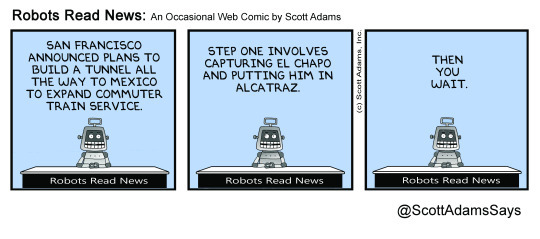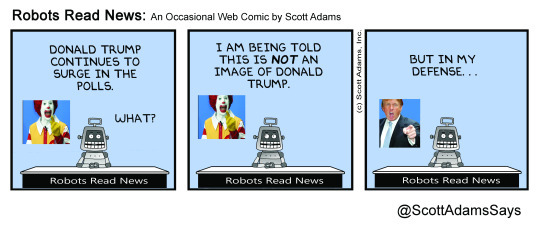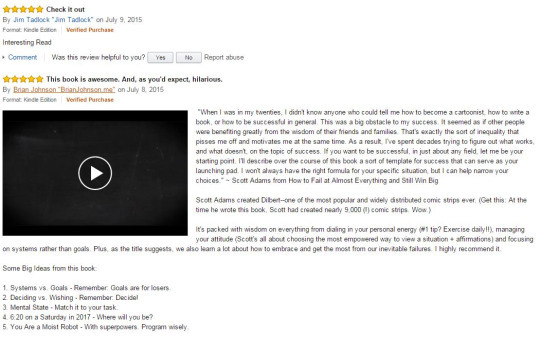Scott Adams's Blog, page 290
July 20, 2015
Updating Some of My Rules
Every now and then I like to update my list of personal rules. I find it helpful to have a list so I can later tell an offender “That’s number six on my list of things I don’t do.” It sounds more decisive than simply stating a preference at the moment.
Scott’s Updated Rules
1. Don’t ask me to remind you of something later. All you are doing is transferring your future failure to me. I’m not going to remember your thing.
2. If you don’t have an opinion on where to eat, I’m going to give you two choices. Please pick one. Ideally, that is the end of the conversation, not the starting point.
3. Don’t mail me anything. And don’t ask me to mail you anything. I no longer allow physical mail in my home. I stop it in the garage and process it for recycling. Physical mail is little more than garbage that gets delivered. (Not counting packages you actually ordered.)
4. Don’t send me to find something for you. I won’t be able to find that email or file you want. I won’t be able to find the mustard in the fridge. I won’t be able to find your keys where you claim you left them. I won’t be able to find anything. If it is lost, and you need it, I can’t solve that problem. I’m busy looking for my own lost stuff.
5. Don’t me tell long stories when my body is three-quarters turned away and I am literally miming that I am taking a step away from you. That is the “I need to do something right now” look and it is your cue to wrap up your story.
6. If I invite you to do anything – no matter what it is – do not extend that invitation to some other dude because you think he would like it too. You may invite a woman without checking with me first. But I do not accept dude pass-through invitation. I have enough guys in my life. I don’t want to meet your friend even though I am sure he is terrific.
7. Don’t ask me to have a movie night at my house. It is not possible to find three adults who want to watch the same movie at the same time.
8. Don’t ask me to take a walk with you if you plan to bring your phone.
9. If you’re being a scientific moron, I’m going to call you out, even if we’re on the same side of a social debate. For example, don’t say marijuana must be safe because it is a plant. I’m not going to let that go.
10. The time to tell me that you will be late is when you first know it. Not after you are actually late.
Do you have any rules of etiquette you would like to update?
Scott
Bonus joke: Over on Twitter I just tweeted “The real hero is Donald Trump’s barber. That guy sacrifices his reputation every day to keep Trump out of The White House. #therealhero”
That is another example of an “engineered” joke that “solves” for two unrelated events. See how easy humor is?
In Top Tech Blog:
When computers can analyze your blood and suggest chemical additives to reprogram you to better health or higher productivity, is that not a case of robots programming humans? That’s coming.
At the moment, a human still makes the ultimate decision about what chemicals get added to the body. But once Watson does better than the human doctors (which is probably already the case), it is turtles all the way down.

July 17, 2015
Robots Read News about Mexican Tunnels
If your company firewall is blocking the image, see it here on Twitter.

This comic is an example of what I call an “engineered solution” joke. You construct this type of joke by combining two unrelated things (El Chapo and commuter train service) and then show how one “solves” for the other.
The thing that makes this joke work is the timing lag. When you read the last panel, your brain has to quickly form some images and piece together the logic for why you only need to wait for a tunnel to appear. When it all comes together in your mind, it triggers a laugh reflex as you realize the idea has an absurd logic to it.
Absurd logic always triggers a laugh. For example, yesterday I tweeted “If you are making love to a dophin, and it says, “Stop screwing with my head,” you are holding it upside down.”
Notice how the absurd logic of the upside-down dolphin creates its own timing delay as you figure out what I meant. You have to create a visual image in your mind to solve for the double meaning. And as soon as you mind thinks “blow hole,” you probably laughed.
It also helps that a dolphin doesn’t look that different upside-down.
Back to today…
Today’s Robot joke also takes advantage of the “insider” effect. People who get the joke will be well-aware that 80% of the public are not following the news and would not understand it. This gives readers an instant “insider” feeling plus a feeling of knowledge superiority, and that can turbo-charge humor and generate more sharing.
This joke also takes advantage of the natural set-up. As soon as you tell me a drug lord escaped via tunnel… on a motorcycle… I know I have something I can work with. And when he has a cute nickname, such as El Chapo, half the work has been done for me.
And if you know about San Francisco, Alcatraz is a fun reference. That will make the joke more fun for the locals and anyone who ever visited.
—
In Top Tech News:
I keep telling you that healthcare costs are going to start dropping sharply because of technological advances, especially in lab testing. Here’s a good example of what is coming.
—
Scott

July 16, 2015
Consciousness is Overrated
Science is finally catching up to the non-science of hypnosis. See this about why your free will is an illusion.
I learned that free will is an illusion during hypnosis training classes in the 80s. When you see a skilled hypnotist reprogram a human in real time, the Moist Robot hypothesis is hard to ignore.
Scott
In Top Tech Blog:
- Here comes version 1.0 of the Holodeck. And obviously this signals the end of humankind. No need to have relationships with other humans when you have a holodeck.
- And finally someone invented a way for me to dress cool. Literally.

July 15, 2015
The Judgy Bubble
I might be one of the least-judgmental people on Earth. That’s because I see humanity as a bunch of moist robots bumping around according to the laws of physics. My worldview doesn’t include free will as anything but a necessary illusion to keep people sane. I never believe people “choose” to be evil or socially unacceptable.
I say this sort of thing often, and that means people quickly identify me as someone who can hear their deepest secrets without judging. And so I do. And that means my view of the world is far different than your view because I have access to what might be called the “judgy” layer of life. I hear the stuff that judgy people don’t hear. And as a result, I see people as equally “flawed” in terms of how society judges such things. Normal? It isn’t even a thing in my experience.
Now let’s say you are a judgy person. Let’s say you hold the view that there is something called “normal” behavior. Your observations support your world view because people act normally around you. People who know how judgy you are hide their freak flags. And that would form a bubble of misinformation for you to live within. Judgy people experience life as a play that is staffed by actors, not real people. Even your friends and family might be trying to avoid your judgy ways by presenting themselves as phony normals.
When a judgy person asks what you did over the weekend, you probably stick to the basics and say you mowed your lawn and had a barbecue. But if I ask the same question about your weekend, I might hear exciting stories of drug deals, orgies, and crimes against nature.
I was thinking about this because I know a couple who are the most judgmental people I have ever known. I can’t imagine sharing an honest opinion with them, and I’m sure no one else does either. As a result, the two of them have created a weird bubble of misinformation from which to view the world. For all practical purposes, they exist in a parallel universe where they are “normal” and the rest of the world continues to worsen.
Do people consider you judgy? If so, everything you know about people is probably wrong because people don’t trust you with the truth.
Scott
In Top Tech Blog:
- Airless tires are here. Just in time, because I was afraid we’d use up all the air in our tires and I would suffocate.
- How about a steering wheel that bugs you to stay awake? If that isn’t a good argument for self-driving cars, what is?
- And a bike helmet that needs to be made by Apple but isn’t yet.
Have I mentioned my book?


July 13, 2015
The Privacy Curve
If you live in a dictatorship, personal privacy might be the only thing keeping you out of jail. And you need that privacy to plan your revolution against the dictator.
If you live in a Republic, such as the United States, you still want some privacy because you don’t want the government to have more power over you than it already has. But the issue is not a life-and-death situation in most cases. Citizens keep an eye on the Republic so it can’t get too far out of hand.
But here is the interesting part: Would you need privacy from the government if you lived in a true democracy, in which every citizen voted on every topic? My guess is that you would not need privacy because most of what you want to do would be legal. And there would be no real “government” in terms of power or leadership. Only the bureaucracy would be left to execute the will of the people.
Thanks to state propositions, the government in the United States is moving from a Republic to more of a pure democracy. And I would argue that the Supreme Court is essentially voting with the majority on social issues and making us less of a Republic than ever.
My hypothesis is that personal privacy (from the government) is neither good nor bad by its nature. What matters is that your privacy level matches up with your political system. If you live in an oppressive regime, the more personal privacy the better. But in a pure democracy, so long as you don’t violate the law, no one cares what you do on your own time. In fact, now that I know my neighbor also likes to wear a kilt and watch the BBC, I have someone to hang out with on weekends.
Would you agree with the general proposition that the more political freedom you have, the less privacy (from the government) you need?
Scott
—
In Top Tech Blog, when will Elon Musk make a gigantic vacuum cleaner to suck up all the broken satellites and other space debris in orbit around the planet? And when do I get my electric airplane?
—
Bonus comic:

My book seems to be catching on.


July 9, 2015
Global Warming Settled?
If you haven’t seen this interactive graph on the causes of global warming, you really should, if only because the technology for the animation itself is outstanding.
I’ll probably run “climate change” through the Rationality Engine at some point, but for now I wondered what reasons the doubters are giving for their doubts. If you are a doubter, take a look at the animation and tell us what part it got wrong.
For the record, I hold the following opinions about climate change that I am happy to change if better data or better arguments pop up.
1. The science is clear that human activity is causing climate change.
2. Experts are often wrong about complex systems with lots of variables. By analogy, much of what you were taught about nutrition when you were young was wrong. Much of what you learned about history is probably wrong. And economic forecasts are generally wrong. None of that means climate change science is wrong. But climate change science does fit the pattern of things that authority figures tell us with more confidence than they ought to have. (I know economics and history are not science.)
4. Climate change might be catastrophic, but I don’t have a way to assess the odds. We can only know things would change if temperatures continue increasing. That change could be good or bad in the long run.
For example, I would expect some income redistribution as the best farmland becomes the worst, and vice versa. And I would expect some inventions to come out of the turmoil. We might even learn to control the global climate directly. Maybe some unexpected cooling event (volcano?) will buy us another hundred years.
My observation of this debate is that both sides are wrong but for different reasons. The skeptics are wrong in denying the data, which seems fairly clear to my non-scientist eyes. (But in all fairness, I would be easy to fool. So would you.)
On the other side, the believers are probably wrong that they can predict the outcome of the climate changes. Climate disruption might lead to the end of civilization. But if that happened, it would be different from every disaster humans have encountered to date. We’re good at solving problems once we get engaged.
Given the unknowns, and the size of the risk, the rational approach is to treat the problem as if it is both real and potentially catastrophic, even if you suspect none of that is true. But I would put the effort into technology solutions because those inventions will probably be beneficial no matter what else happens.
Scott
—-
Bonus question: If doctors put a chip in you that releases medicine based on the chip’s internal timer, and that medicine fundamentally changes who you are – let’s say it is an anti-depressant that works – could it be said you are still a human being? In my view, you would be a robot, because the chip decides your mood and how you act. If the chip gives you too little meds, you stay in bed, depressed. If the chip releases enough meds, you get up and go to work. That looks like a robot to me. Oh, and that chip already exists.
—
I can no longer claim the Huffington Post gets everything wrong.
One of their reviewers likes my book a lot.
And this is the first time I have seen an embedded video book review on Amazon. See the video here that talks about the “big ideas” in my book. (The image below is just a jpg).


July 7, 2015
The Interruption Economy
Q: What do Google, Facebook, Twitter, Apple, and Samsung all have in common?
A: Their business models involve interrupting you all day long.
Individually, each company’s interruptions are trivial. You can easily ignore them. But cumulatively, the interruptions from these and other companies can be crippling.
In the economy of the past, companies made money by being useful to customers. Now the biggest tech companies make their money by distracting you with ads and apps and notifications and whatnot. I don’t mean to sound like an alarmist, but I think this is the reason 80% of the adults I know are medicating. People are literally being driven crazy by a combination of complexity (too many choices) and the Interruption Economy.
There are days when my brain is flying in so many directions that I have to literally chant aloud what I need to do next in order to focus. Here’s what that can look like.
Me chanting:
Find the file, find the file, find the file, find the file.
Open the file, open the file, open the file
Search for the keyword, search for the keyword, search for the keyword, search for the keyword
copy the paragraph, copy the paragraph, copy the paragraph
paste it into Word, paste it into Word, paste it into Word
In the sixty seconds it might take to complete a simple task of finding and copying some text, I would normally have seven-to-ten important thoughts that have to be acted on right away. For example, I might remember an upcoming meeting I forgot to write down. If I interrupt my task to add it to my calendar, I will improve my odds of making it to the meeting. But if I let the diversion win, I will likely get diverted again and again by equally “urgent” tasks until I wake up in a corn field miles from home with a donkey, a toaster, and no memory of how it all happened.
So, as a defense against distractions, I sometimes need to chant my current steps as I do them. And it helps me focus.
I’m wondering if you have as many distractions in your life. And if you do, can the chanting help you too? The next time you have a boring task that you know will be subject to lots of interruptions, try the chanting technique and let me know how it goes. It probably won’t cure your ADHD but it might help you ignore the tech industry’s distractions until you get your tasks done.
Bonus question: The economy has evolved from “How can I help you?” to “How can I distract you?” Can that trend lead anywhere but mass mental illness?
My hypothesis, based on observation alone, is that the business model of the tech industry, with its complexity, glut of options, and continuous interruptions are literally driving people to mental illness.
Scott
Radio Host Maureen Anderson likes my book.
So do these recent reviewers.


July 3, 2015
Hedging Your Bets on the God Hypothesis
Business Insider has a an interesting article on 22 surprising facts about Americans. Some of those facts sure surprised me.
For example, here are two bits from the same article.

That sounds about right to me. Then add the other religions and you’re probably above 80%. Maybe as high as 90% according to other surveys I have seen.
But in the same article we see this statistic.

I’m no religious scholar, but I thought being “very confident in the existence of a supreme being” was a requirement for most religions in America. But according to these statistics, assuming I am reading them right, one can be a Christian without being 100% sold on the God part of it.
By my reckoning, over a third of our citizens are wasting time with religions that will doom them to eternal Hell for their doubts alone. I might be heading there too, but at least my Sundays are free.
Am I reading the statistics wrong? I’m baffled.
Scott
—
In Top Tech Blog:
- You know how I always go on about how great it would be to design an entire city from the ground up, using all we know today? (That is my long term plan, by the way.) It seems that technology will get us to the point where we can design an entire city in a computer simulation, walk through it using immersive 3D goggles, then print the entire city with 3D printers. See that possibility (if you use your imagination), and lots more 3D printer coolness, in this article.
—
These readers have excellent taste in books.


July 2, 2015
Outragists Attack Trump and Win
You’ve probably seen Donald Trump’s recent quote about Mexican immigration. He said, “They’re bringing drugs, they’re bringing crime, they’re rapists, and some I assume are good people."
People with good reading comprehension can see that he put no percentages on how many Mexican immigrants are criminals and how many are “good people.” He notes it is a mix, with the clear implication that the ratio of bad people is unacceptably high.
What does the data say? Beats me.
But if, for example, 20% of Mexican immigrants are bringing crime to the United States, is that enough to be worried about? I’m guessing 20% of Americans in our lower income groups are involved with drugs and other forms of crime, so that sounds like a reasonable range to guess for Mexicans coming to this country illegally. Is 20% too much? How about 10%? It seems subjective to me. But it isn’t an absurd issue to worry about.
Now check out this typical headline from Business Insider that cleverly converts Trumps quote into “NBC fires Donald Trump after he calls Mexicans rapists and drug runners.”

Writers don’t usually pick their own headlines, so don’t blame the writer in this case. Just note that Trump’s comment about some Mexican immigrants being criminals has been morphed by outragists into “Trump says Mexicans are rapists and drug runners.” That implies all Mexicans, even the ones that stay home, are up to no good. Very different from what Trump actually said.
I’m not a Trump supporter. I’m just anti-outragism.
In the run-up to the presidential election, the media is spring-loaded for candidate “gaffes” that they can take out of context to manufacture news. I’ll point them out as we go.
Update: Same writer, new article. Note the use of the “douche bag” photo that often accompanies stories like this one. The photo director should get a writing credit for this one. It changes the story.

Scott
In Top Tech Blog, machines help you grow better skin, your clothes will be your new computer, and look out for holograms you can touch. (That last part seemed inevitable. Scientists are lonely.)
—
The five-star reviews keep rolling in for this book.


July 1, 2015
Update on the ISIS “Filter Fence”
Last August I described in this blog an idea for creating a safe zone for civilians that want to escape ISIS-held territory. You can see that here. The idea is based on a novel I wrote years ago, the sequel to God’s Debris, called The Religion War.
The idea is that a friendly country would create a well-defended safe zone that could be used over time to drain the civilians from ISIS territory. Once you have as many innocents out of the Caliphate as you reasonably can, which could take years, you seal the borders, cut off communication, and let nature do the rest.
There are all kinds of problems with that plan, but compared to the terrible alternatives, I think it has to be considered as an option. And now it looks like something akin to that plan is under motion. Turkey is likely to carve out a safe zone near its borders to block ISIS supply lines, create a buffer zone, and…create a haven for refugees.
No one would call it a Filter Fence because the primary objectives are cutting ISIS supply routes and defending Turkey’s borders. But the result will be a Filter Fence with a safe zone to drain civilians out of the area.
Saudi Arabia is already building a “bad ass” wall to keep ISIS out. Turkey’s future safe zone will be the second wall. If Iran figures out a way to seal their border tight (and obviously they are working on it) you have a pretty good Filter Fence in place. Here I’m assuming Israel and Jordan have their borders under control as well. Here’s a refresher map of the region.
You hated the Filter Fence idea when I first raised it. But it looks like things are evolving in that direction. In The Religion War, the trigger for sealing the Caliphate involves terrorist drone attacks around the world. That seems inevitable.
Am I the only one who sees the Filter Fence around ISIS as 100% likely? (Barring a meteor striking Earth, or something else that big.)
Scott
In Top Tech Blog, thank goodness someone finally figured out how to run an annealing algorithm to find the lowest points, corresponding to optimal or near optimal solutions, in a virtual “energy landscape.” Also, blah, blah, something quantum computing.
And now you can 3D-print a human heart. I think that is the perfect gift for a romantic partner. (This is just a small sample of why I am not married.)
Apparently it is Samsung’s turn to say it is inventing an awesome battery technology that won’t be ready for market soon. Next!

Scott Adams's Blog
- Scott Adams's profile
- 1258 followers



